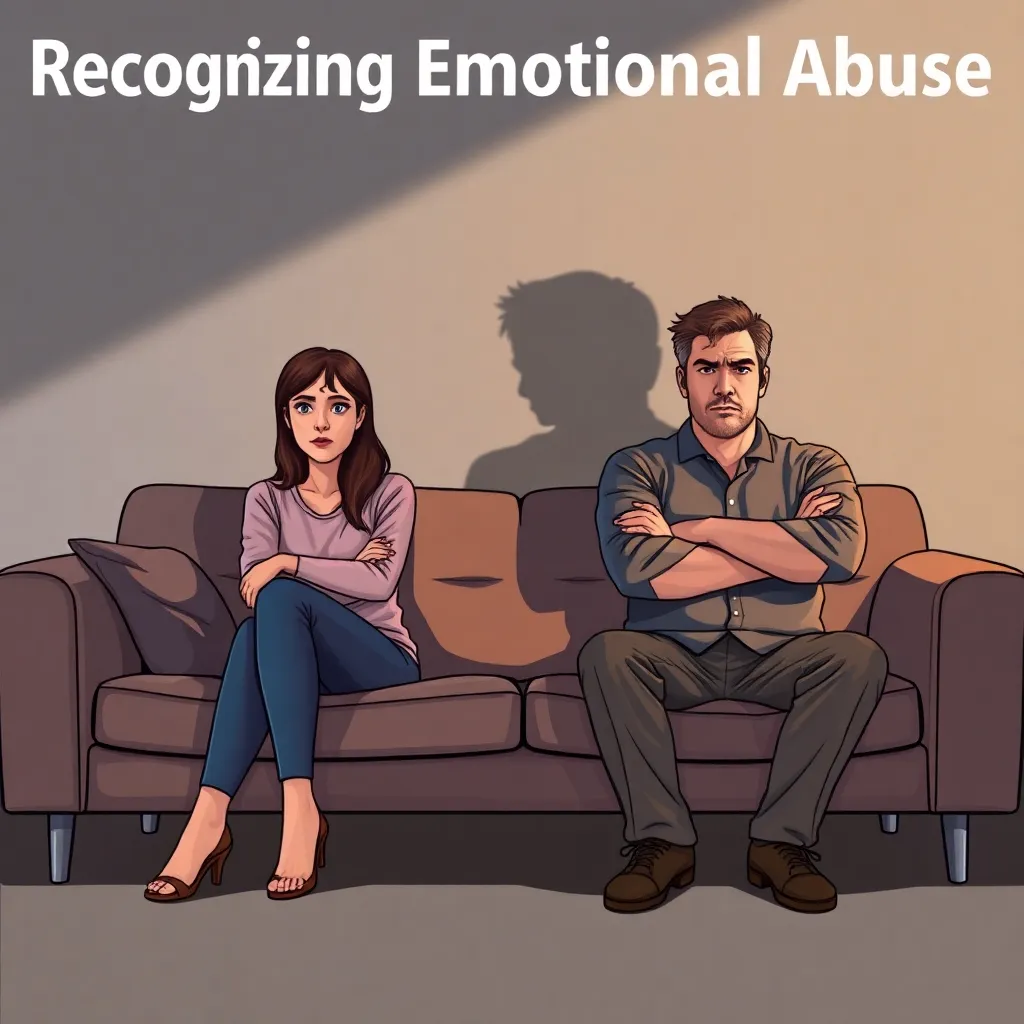In the intricate tapestry of relationships, it can sometimes be difficult to distinguish between genuine care and subtle control. If you’ve ever found yourself questioning whether certain gestures are truly loving or if they carry an underlying intent, you’re not alone. Emotional abuse often masquerades as kindness, making it challenging to detect and even harder to address. This article aims to shed light on such complexities, offering clarity and support to those navigating these murky waters.
Understanding the signs of emotional abuse disguised as care is crucial for maintaining a healthy relationship. By the end of this article, you will be equipped with the knowledge to identify 15 red flags that often go unnoticed. Our goal is to empower you with insights that can transform your emotional landscape, fostering relationships that are genuinely nurturing. As you read on, you’ll discover practical advice and empathetic guidance designed to help you recognize and address these subtle yet significant warning signs.
In sharing these insights, we hope to create a safe space where you feel validated and understood. Whether you’re questioning your current relationship or simply wish to be more informed, this article provides an essential resource. Remember, recognizing these red flags is not just about identifying potential harm, but also about embracing a path to healthier, more fulfilling connections. Let’s embark on this journey together, prioritizing your emotional well-being and the authenticity of your relationships.
1. Guilt-Inducing Compliments

In the complex landscape of relationships, **guilt-inducing compliments** can be an insidious form of emotional abuse. They often come wrapped in the guise of caring remarks, but they leave you feeling uneasy or indebted.
Consider a scenario where your partner says, “You look beautiful, especially when you make an effort just for me.” On the surface, it sounds sweet, but the underlying message implies that you’re not good enough unless you’re constantly striving to meet their standards.
It’s important to recognize that these compliments are not genuine affirmations but rather **tools of manipulation**. They subtly pressure you to conform to someone else’s expectations, undermining your self-worth and autonomy.
To counter this, practice setting boundaries and communicating openly about how these comments make you feel.
By acknowledging the impact of these remarks and addressing them directly, you empower yourself to maintain a healthier emotional balance in your relationship. Remember, genuine compliments should uplift and celebrate you, not make you feel like you’re falling short.
2. Overbearing Acts of Service

When someone insists on performing every possible task for you under the guise of care, it may seem like they are being extremely helpful. However, such overbearing acts of service can often mask an underlying need to control or diminish your independence. Imagine a partner who insists on doing all the household chores, even when you express a desire to share the load. This behavior might be presented as a form of love, yet it subtly communicates that you are incapable of managing things on your own.
Another scenario involves a partner who consistently makes decisions for you without consulting your opinion. For instance, they might plan every weekend activity without asking for your input, framing it as a way to surprise you. While surprises can be delightful, consistently bypassing your wishes can make you feel unheard and undervalued. This form of emotional manipulation can erode your sense of autonomy over time.
According to relationship experts, it is crucial to recognize that healthy relationships are built on mutual respect and shared responsibilities. If you find yourself feeling suffocated by your partner’s constant actions, it’s important to have an open conversation about your needs. Expressing your desire for a more balanced relationship can help establish a healthier dynamic.
Ultimately, a caring partner will respect your boundaries and support your personal growth. They will understand that love is not about controlling or doing everything for you but about empowering each other. By recognizing these subtle signs of overbearing behavior, you can work towards a relationship where both partners feel valued and supported.
3. Constant Need for Reassurance

In some relationships, a partner’s need for reassurance can appear as a sign of deep caring, but it may actually mask an underlying issue. A constant demand for validation, such as needing repeated affirmations of love or worth, can become emotionally exhausting and indicative of insecurity.
Imagine being asked several times a day if you still love them or if they look good enough. Such behavior can make you feel as though you’re walking on eggshells, catering to their fragile self-esteem rather than building mutual trust.
According to relationship experts, this behavior often stems from past experiences of rejection or betrayal. When left unchecked, it can morph into a cycle of emotional dependency, where one partner feels responsible for managing the other’s emotional well-being.
Encouraging open communication about these feelings can be a first step toward resolving this issue. It’s crucial to set boundaries and gently remind your partner that while reassurance is important, so is fostering self-confidence.
By addressing the root causes of this need for reassurance, couples can work toward a relationship built on a foundation of mutual respect and emotional independence. This approach not only strengthens the partnership but also supports personal growth for both individuals involved.
4. Unsolicited Life Advice

While it may seem well-intentioned, unsolicited life advice can often be a subtle form of control. Imagine a partner who consistently tells you how to handle your job, friendships, or even hobbies, making you feel like your own decisions aren’t valid.
In such scenarios, the advice given is less about support and more about asserting dominance. This can leave you doubting your own capabilities and create a reliance on their approval, which is unhealthy.
Experts highlight that genuine care involves listening and supporting rather than directing. If you feel that your partner’s advice is more about them having the last say, it’s crucial to set boundaries.
Consider a scenario where every decision, big or small, is met with a “you should have done…” comment. This behavior is a red flag that should not be overlooked as mere concern.
Ultimately, recognizing this pattern helps in reclaiming your independence. By maintaining a space where your choices are respected, you foster a healthier relationship dynamic.
5. Dismissive of Your Feelings

It can be surprisingly damaging when someone is consistently dismissive of your feelings, even if it seems like they’re simply trying to minimize conflict. For instance, if you express discomfort or upset about a situation and your partner responds with, “You’re overreacting,” it can undermine your emotional reality. This behavior suggests that your partner may not validate your emotions or take them seriously, which can lead to feelings of isolation and self-doubt.
In many relationships, partners may unintentionally invalidate each other’s emotions by dismissing them as trivial. Imagine sharing with your partner how a colleague’s comment upset you, only to be told, “It’s not that big of a deal.” This kind of response can make you feel unheard and undervalued, eroding the emotional safety that is crucial in any relationship.
Experts emphasize the importance of emotional validation as a cornerstone of healthy relationships. Dr. John Gottman, a renowned relationship researcher, notes that empathy and understanding are key to building trust and intimacy. When a partner dismisses your feelings, they close the door to meaningful communication and understanding, which are vital for resolving conflicts and growing together.
To counteract dismissive behavior, it’s important to communicate how it affects you and to set boundaries around how you wish to be treated. A constructive approach is to express your need for your emotions to be acknowledged without judgment. By fostering open dialogue, couples can work towards building a more empathetic and supportive relationship.
In summary, being dismissive of your partner’s feelings can create a rift that hinders emotional connection and trust. By actively listening and validating each other’s emotions, couples can cultivate a nurturing environment where both partners feel valued and understood. Recognizing and addressing dismissive behaviors is a crucial step towards a healthier and more fulfilling relationship.
6. Excessive Gift-Giving with Strings

Sometimes, what seems like a shower of affection can mask deeper issues, such as when a partner’s gift-giving becomes excessive and comes with hidden expectations. For instance, receiving frequent, lavish gifts might initially feel like a sign of love, but if these gifts come with an expectation of compliance or guilt-tripping, it becomes a tool of control.
In many relationships, gifts are a way to express love and appreciation. However, when gifts are used as leverage—like expecting you to prioritize their needs or turn a blind eye to problematic behavior—they become a red flag of emotional manipulation.
Consider a scenario where a partner gives you a beautiful bracelet but later uses it to remind you of how much you “owe” them. This kind of manipulation can create a sense of indebtedness, making it difficult for you to set boundaries or express your own needs.
Experts suggest that open communication is key to overcoming this dynamic. If you feel overwhelmed by the strings attached to gifts, it’s important to speak up and express how these actions make you feel.
Ultimately, true caring is demonstrated through respect, understanding, and support without conditions. By recognizing and addressing these patterns, you can foster a more balanced and fulfilling relationship, unburdened by manipulative tactics.
7. Monitoring Your Social Interactions

Monitoring your social interactions may initially appear to be a sign of caring, but it often masks deeper issues of control. A partner who constantly asks who you’re with or checks your messages might be crossing a boundary into emotional abuse. Imagine a scenario where your partner insists on knowing the details of every conversation you have with your friends. This behavior can lead to feelings of isolation and anxiety about socializing.
Consider the subtle ways in which this monitoring can manifest. They might frame their questions as concern, saying things like, “I just worry about the kind of people you hang out with.” While this may seem thoughtful on the surface, it’s important to recognize the underlying intention of control. Healthy relationships are built on trust, not surveillance.
Experts advise that open communication about boundaries is crucial in these situations. If you notice your partner frequently scrutinizing your social life, it’s essential to discuss how it makes you feel. Setting boundaries can help re-establish a sense of personal space and autonomy. A supportive partner will respect these boundaries rather than dismiss them.
Ultimately, a relationship that thrives on respect will allow each partner the freedom to maintain their own friendships and social circles. By fostering trust and communication, both partners can feel secure without resorting to control. Remember, the goal is to nurture a relationship where both individuals feel valued and free.
8. Belittling Under the Guise of Humor

When humor becomes a tool to consistently belittle or demean, it can be a subtle form of emotional abuse. In relationships, one partner might often make jokes at the other’s expense, leaving them feeling small and undermined under the guise of being “just playful.”
Consider a scenario where every gathering turns into an opportunity for someone to highlight their partner’s flaws through humor. These instances might be dismissed as harmless, but over time, they erode self-esteem and create a toxic dynamic.
Experts explain that while humor is vital in relationships, it should never make one partner the butt of all jokes. Healthy humor fosters connection and joy, whereas belittling humor can cultivate resentment and hurt.
For those experiencing this, it’s crucial to communicate how these jokes affect you. Approach the situation calmly and share your feelings, emphasizing the need for mutual respect and understanding.
Ultimately, a partner who respects and values you will acknowledge your discomfort and strive to change their behavior. The goal is to ensure that laughter in your relationship brings you closer, not further apart.
9. Undermining Your Achievements Subtly

In relationships, it’s important to recognize when someone is subtly undermining your achievements. This often manifests as slight remarks that seem supportive but are actually designed to diminish your accomplishments. Imagine sharing exciting news about a promotion, only to have your partner say, “That’s great, but I hope it doesn’t mean you’ll be working late all the time now.”
Such comments might initially appear as concern, but they can erode your self-confidence over time. It’s crucial to pay attention to these patterns, as they can chip away at your self-esteem and make you question the value of your accomplishments. When you notice this happening, it’s important to address it directly and express how these comments affect you.
Experts suggest that in healthy relationships, partners celebrate each other’s successes without reservation. A supportive partner will genuinely share in your joy and offer encouragement, rather than casting doubt on your achievements. If you find that your partner often downplays your successes, it might be time to have an open conversation about how you both can support each other’s growth.
Addressing subtle undermining behavior is not just about confronting the issue, but also about fostering a positive environment where accomplishments are celebrated. Encourage mutual support by sharing your feelings and working together to build a more affirming relationship. Remember, recognizing and addressing these red flags is a step toward nurturing a healthier connection.
10. Frequent Use of Silent Treatment

In the intricate dance of relationships, the silent treatment can be a subtle yet powerful tool of emotional manipulation. Often masked as a way to “cool off” or “reflect,” it is, in reality, a tactic that leaves the other person feeling isolated and confused.
Imagine a scenario where a partner suddenly stops all communication after a disagreement. Instead of fostering understanding, this silent barrier creates an environment of uncertainty and fear, leaving one partner guessing what went wrong and how to make it right.
Relationship experts highlight how the silent treatment can be as emotionally damaging as a direct confrontation. It disrupts the emotional connection and can lead to a cycle of anxiety and self-doubt for the person on the receiving end.
To navigate this, it’s crucial to establish an open dialogue about how silence affects both partners. Setting boundaries and agreeing on healthier ways to handle conflicts can prevent this behavior from becoming a pattern.
Ultimately, a relationship should feel safe and supportive, where both partners work together to address issues rather than retreat into silence. Recognizing and addressing the silent treatment is a step towards building a more resilient and understanding partnership.
11. Jealousy Posed as Deep Care

In some relationships, jealousy is often cleverly disguised as a sign of deep care and affection. However, when a partner’s jealousy becomes excessive, it can transform into a form of emotional control that limits your freedom and autonomy.
Imagine a scenario where your partner constantly questions your whereabouts or feels uneasy when you spend time with friends or family. This type of behavior can be framed as protective, but in reality, it might be an attempt to isolate you and ensure that you remain under their constant supervision.
Experts suggest that healthy relationships are built on a foundation of trust and mutual respect. If a partner’s jealousy forces you to continuously justify your actions, it could be an indicator of an underlying issue that needs to be addressed with open communication.
It’s important to recognize the difference between genuine concern and controlling jealousy. While it’s normal for partners to have occasional insecurities, persistent doubt and suspicion can erode the trust that is essential for a thriving partnership.
Ultimately, understanding the root of jealousy and addressing it with empathy can strengthen the bond between partners. By doing so, you pave the way for a relationship that is based on trust and mutual understanding, rather than control and suspicion.
12. Controlling Decision-Making ‘for Your Good’

In relationships, it’s not unusual for partners to make decisions together, but when one person insists on controlling decision-making under the guise of “it’s for your good,” it’s a red flag. This might look like a partner deciding what you should wear, eat, or who you should spend time with, all while claiming it’s in your best interest.
Imagine a scenario where a partner insists on choosing your friends because they believe they know what’s best for you. This behavior might initially seem caring, but over time, it can lead to a loss of personal autonomy and make you feel trapped.
Experts highlight that genuine care in relationships involves supporting each other’s choices, not dictating them. Healthy partnerships thrive on mutual respect and understanding, allowing each person to make their own decisions.
If you find yourself questioning whether your partner’s behavior is too controlling, consider how often you feel free to make choices without their input. Trust your instincts; if it feels like your independence is being compromised, it might be time to address it.
Ultimately, a relationship should be a partnership where both people feel empowered and respected. Embracing each other’s individuality while supporting one another is the cornerstone of a healthy, fulfilling relationship.
13. Creating Dependency Through Criticism

In some relationships, what appears as caring can slowly morph into a pattern of subtle criticism that fosters dependency. A partner might frequently question your choices or highlight your perceived flaws under the guise of helpfulness, leaving you feeling less confident in your ability to make decisions.
Take, for instance, a partner who constantly points out your mistakes while cooking, claiming it’s to help you improve. Over time, this persistent criticism can erode your self-esteem, making you rely more on their approval and guidance for even the simplest tasks.
Experts suggest that this behavior can stem from a need to feel superior or in control within the relationship. By creating an environment where you’re unsure and reliant, the critical partner reinforces their role as the ‘more capable’ one, subtly ensuring their position in your life.
To counteract this, it’s important to recognize when criticism is constructive and when it’s serving to undermine your confidence. Having open and honest conversations about how such comments affect you can encourage a healthier dynamic.
Ultimately, fostering a relationship where both partners feel equally valued and capable is crucial. Seeking support from friends, a counselor, or a support group can also provide additional perspectives and empower you to reclaim your autonomy.
14. Constantly Playing the Victim Card

In emotionally abusive relationships, the abuser often adopts the role of a perpetual victim, manipulating the narrative to gain sympathy. This behavior can be confusing, as their claims of being wronged can make you question your own actions and intentions.
Consider a scenario where your partner consistently blames you for their own emotional struggles. By portraying themselves as the one always suffering, they evade accountability and shift the focus away from their own shortcomings.
Experts suggest that this tactic is a form of emotional manipulation, designed to keep you in a state of constant reassurance and caretaking. Over time, this can lead to a cycle where you feel obligated to prioritize their needs over your own, fostering an unhealthy dynamic.
To counter this, it is essential to recognize when you are being unjustly burdened with guilt. Setting boundaries and communicating your own feelings can break the cycle of victimhood and restore balance in the relationship.
Ultimately, a healthy relationship requires both partners to take responsibility for their actions and emotions. By identifying this red flag early, you can work towards a more equitable partnership where both individuals feel valued and understood.
15. Emotionally Withholding as Punishment

In some relationships, a partner might choose to engage in emotionally withholding as a means of control or punishment. This may involve a sudden shift from warmth to coldness or a refusal to engage in meaningful conversation, leaving the other partner feeling confused and isolated.
Imagine a scenario where after a minor disagreement, your partner suddenly becomes unresponsive or distant. This behavior can be a form of emotional manipulation, making you feel like you must earn back their affection or attention through compliance.
Experts suggest that this tactic is often used to instill a sense of insecurity and dependence in the relationship. By withholding emotional support, the abuser maintains power, as the other partner may feel compelled to apologize or change their behavior to regain the lost connection.
To counteract this, it’s important to communicate openly about how this behavior makes you feel and to establish clear boundaries. If the pattern continues, consider seeking professional guidance to explore the underlying dynamics and ensure your emotional well-being is prioritized.
By recognizing emotionally withholding tactics as a red flag, you empower yourself to take steps towards a healthier relationship dynamic. Remember, a truly caring partner will want to communicate openly and supportively, even during disagreements.
Conclusion: Creating Beautiful Outdoor Spaces
In recognizing the subtle signs of emotional abuse disguised as caring, we’ve identified 15 crucial red flags: persistent criticism, controlling behaviors, isolation from friends and family, excessive jealousy, guilt-tripping, unpredictable temper, dismissive attitudes, gaslighting, undermining self-esteem, using love as a weapon, financial control, emotional blackmail, invalidation of feelings, conditional affection, and relentless blame-shifting. These behaviors, often masked as concern, can slowly erode one’s self-worth and autonomy.
To take immediate action, begin by reflecting on your relationships and identifying any of these red flags. Open a dialogue with trusted friends or a therapist to gain perspective and support. Remember, recognizing these signs is a powerful first step toward healthier interactions.
Save or bookmark this article as a vital resource for ongoing reference and self-awareness. By keeping these insights close at hand, you empower yourself to nurture relationships that are genuinely loving and supportive.
Looking forward, remember that successful relationships are built on mutual respect, trust, and open communication. With vigilance and proactive steps, you can cultivate connections that foster growth and happiness for both you and your partner. Let this be your guide to thriving, not just surviving, in love.
